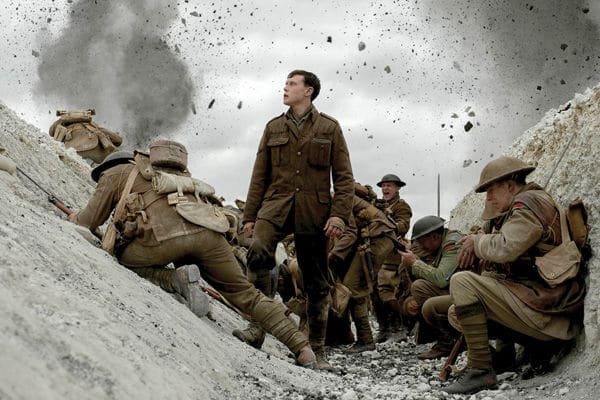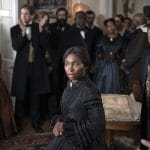The WWI drama, “1917,” has one of the most amazing productions I’ve ever seen. The cinemaphotography, with its opening super-long tracking shot (what did we do before Steadicams?) that follows two young men through battlefields, into trenches, underground headquarters, over rivers, all in real time, without cutting away—this is the product of brilliant, creative filmmakers. The story itself is a perfect example of what screenwriters call the “12 steps of the hero’s journey”: being sent from a familiar world into the unknown on a quest, conquering obstacles along the way, meeting both enemies and helpful friends, coming to the end of the journey with a final obstacle to be overcome, and so on. What the film does really well is place us right there on the field of battle with such visceral details and effects that the reality of the horrors of war sends shivers through our bodies. All that being said, I personally felt somewhat detached from the story itself and I’m not sure why, but many I’ve talked to did not feel that way. Kudos to director/co-writer Sam Mendes, the young, talented cast and legendary cinematographer Roger Deakins.
If you didn’t study Harriet Tubman in American history, then your education was lacking. Her name was synonymous with the Underground Railroad, which spirited runaway slaves to non-slave states and eventually to Canada during the period preceding and during the U.S.Civil War. “Harriet,” while not a masterpiece, does the job quite nicely of highlighting her amazing grit, bravery and dedication. Cynthia Erivo, a Tony Award-winning British actress, singer and songwriter, gives the film its heft due to her shining performance. Having recently read Colson Whitehead’s excellent novel, “The Underground Railroad,” a book that moved me to tears and tore my heart out (as it has done to most everyone who’s read it), the movie that covers the same period of time and a similar lone female journey to the North doesn’t grab us the way the book does. Still, as my friend whom I saw it with said, “It’s an excellent history lesson and we all need to see it.” Enough said.
Once again proving that Tom Hanks is an American treasure and an often-underrated actor, “A Beautiful Day in the Neighborhood” brings us his version of beloved children’s TV host Mr. Rogers, which manages to be a superior amalgam of both Fred Rogers and Hanks himself. It’s a lovely, nuanced performance. The main story, that of magazine writer Lloyd Vogel and his estrangement from his father, is somewhat cookie-cutter in its plotting from rage to redemption, but is nonetheless moving. Both Matthew Rhys (Vogel) and the always excellent Chris Cooper (the elder Vogel) are deeply immersed in their roles. Susan Kelechi Watson as the younger Vogel’s wife brings a vivid, multifaceted woman—certainly much more than “the wife”—to the entire undertaking. Yes, the previous year’s documentary, “Won’t You Be My Neighbor?” was a more successful work, but this one is worth seeing, for sure. Let’s face it, in the world in which we live today, more of the acceptance and gentleness of Mr. Rogers can’t hurt any of us.
“The Two Popes,” which I saw a while ago, surprised me. That day, I wasn’t really in the mood to see a film about anything to do with religion, but having done so I can say that it’s quite delightful, and highly recommended. It’s an imaginary meeting between the two most recent pontiffs and it’s pretty much all talk, the kind of thing PBS does so well, and aimed at the AARP crowd. In this case, I think all ages will enjoy it; after all, the popes are played by two superb actors, Anthony Hopkins (as Pope Benedict) and Jonathan Pryce (as the future Pope Francis). The script by Anthony McCarten is crisp and often amusing; director Fernando Meirelles does a fine job of basically taking what could have been a two-character, one-set stage play and opening it up with gorgeous sets of huge, treasure-filled Vatican rooms and hallways and colorful flashbacks to both men’s youths and the experiences that shaped them.


